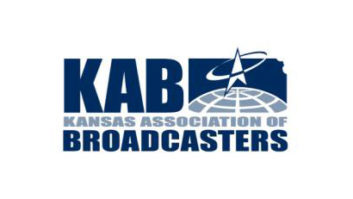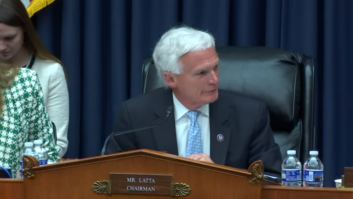
This shortwave curtain antenna at the transmitting station in Saipan serves the broadcasters of the U.S.-government-funded Broadcasting Board of Governors.
Credit: BBG
The U.S. government will have fewer restrictions on its ability to communicate directly with its own citizens via certain media platforms if proposed dissemination changes are adopted by Congress.
Repeal of the domestic ban spelled out in the Smith-Mundt Act of 1948 would allow the U.S. Broadcasting Board of Governors to recirculate content to listeners and viewers in the United States via private broadcast partners.
Supporters on Capitol Hill believe this change is long overdue, considering that technological advances make such content readily available in this country already. Lifting the ban, they believe, would aid in diplomacy, increase transparency and help the government reach international communities on U.S. soil.
Opponents fear the legalization of government-issued propaganda. They worry about allowing the government undue domestic influence on citizens and think BBG would shift focus and finances away from its important foreign mission.
The BBG sets policies and provides oversight of U.S. government-funded operations that broadcast overseas. This includes the Voice of America, Radio and TV Martí, Radio Free Europe/Radio Liberty, Radio Free Asia and the Middle East Broadcasting Network.
Reps. William “Mac” Thornberry, R-Texas and Adam Smith, D-Wash., introduced H.R. 5736, the Smith-Mundt Modernization Act of 2012, in May to update the law covering how the federal government communicates to foreign audiences through broadcast and other means. The provision has been considered outdated by broadcasters at BBG since the spread of the Internet and satellite broadcasting.
The measure was included in a version of the National Defense Authorization Act approved by the House and forwarded to the Senate in late May, according to Alison Lynn, Thornberry’s office press representative. The Senate was expected to take up the NDAA in July but Lynn said it was delayed. Most observers agree it’s likely the bill will end up in conference as the chambers resolve differences.
The Smith-Mundt Act was created shortly after World War II to prevent any sitting administration from using U.S. government media to influence the American public and promote a specific political agenda, observers said.
“H.R. 5736 eliminates the existing ban on domestic dissemination of public diplomacy material, which prohibits such material from being viewed in the United States,” Thornberry said in a statement.
“Eliminating the ban updates the law to reflect technology advances, removes a barrier to more effective and efficient public diplomacy programs, provides transparency of these programs to U.S. citizens and allows the material to be available to inform domestic audiences.”
Thornberry also stated, “This is not 1948 when everyone was tuned to a few radio stations. The 21st century media environment is already very diverse and open.”
The bill emphasizes that the State Department and BBG are not to compete with private news organizations.
Thornberry bill
The BBG is supporting the effort. It listed repeal as a goal in a strategic five-year plan set out late last year, a plan that included broader changes in its identity and goals.
(Its new mission statement: “To inform, engage and connect people around the world in support of freedom and democracy.” BBG wants to become “the world’s leading international news agency by 2016, focused on the agency’s mission and impact,” and hopes to reach 216 million people in global weekly audience by that time.)
A BBG spokeswoman said the Thornberry bill “accomplishes what the agency (with the current administration’s support) has been seeking in its FY 2012–13 authorization request to Congress — which is an easing of the Smith-Mundt domestic dissemination ban. The administration’s legislative request for FY ’12–13 relates specifically to BBG programming.”
Most of VOA’s material is already available online, according to the BBG, and this amendment would not change the BBG mission to broadcast to foreign audiences, she said.
“Our funding is provided only to produce programming to foreign audiences. The BBG would not produce programming for domestic use, nor would it use agency resources to transmit programming in the U.S. The bill restates language in previous legislation stating that the State Department and BBG shall not seek to influence public opinion in the United States.”
The bill specifies that the Smith-Mundt Modernization Act of 2012 only applies to the Department of State and the Broadcast Board of Governors.
According to an analysis by Matt Armstrong, former director of the U.S. Advisory Commission on Public Diplomacy, the Thornberry bill would “authorize the domestic dissemination of information and material about the United States intended primarily for foreign audiences and for other purposes.”
“Even though the material is online and available to people in the United States, the BBG [today] must still say ‘no’ to requests to re-use and disseminate BBG products in the U.S. That would change if the proposed amendment is approved,” said Armstrong, who also publishes the blog MountainRunner.us.
A case often cited by supporters of the changes is that of a Minneapolis-based radio station, which serves a large Somali-American audience. It was denied permission to replay a VOA-produced piece rebutting terrorist propaganda.
“Even after the community was targeted for recruitment by al-Shabab and other extremists, government lawyers refused the replay request, noting that Smith-Mundt tied their hands,” according to a press release issued by Thornberry’s office.
Former BBG Chairman Jim Glassman, founding executive director of the George W. Bush Institute, supports the amendment and believes the current prohibition is anachronistic.
“All BBG programming is readily available in the United States through websites, and many language services are active on YouTube, Facebook and other social media platforms,” Glassman said. “Diaspora communities in the United States, seeking information in their native languages, can benefit from the accurate news and information delivered by BBG language services — and they can and do pass it on to relatives and friends in BBG target countries around the world.”
If the amendment passes, Glassman predicts the BBG would use the opportunity to increase U.S. engagement with the rest of the world through social media.
‘Small, vocal constituency’
Debate on the bipartisan bill has stirred up a “mostly small and vocal constituency,” said Dr. Gregory Newton, an associate professor and associate director in the School of Media Arts and Studies at Ohio University. He follows international broadcasting developments.
“Any law intended to limit information flow and that is based on a 60- or 70-year-old conception of propaganda, media infrastructure, not to mention an irrational fear of Communists in the State Department, is naïve and outdated, at best; or worse, maybe even counter-productive,” Newton wrote in an e-mail to Radio World.
“Most audiences are sophisticated enough to recognize blatant propaganda and other less-than-honest journalism by a government broadcaster.”
Newton, who also is president of the Broadcast Education Association, added that “there are some voices that just want to get rid of the BBG.”
Armstrong and others don’t expect BBG to spend resources on homeland dissemination. “If BBG decides to direct resources and efforts domestically, then I’d say the leadership failed,” Armstrong said. However, there are observers of U.S. international broadcasting who worry the plan will do just that and allow the BBG to propagandize American citizens.
“Allowing the BBG to market their programs in the U.S. without any restrictions is a dangerous idea because it counts on government bureaucrats to restrain themselves on their own,” said Ted Lipien, a former Voice of America official. He co-founded the Committee for U.S. International Broadcasting, which describes itself as a non-partisan media freedom advocate.
Lipen’s group also raises concerns about transparency and accountability if the changes are enacted. “Any modernization should make clear that the BBG is not allowed to actively market their programs domestically, target any specific groups of Americans and spend taxpayer money on domestic advertising,” according to Lipien.
More on Smith-Mundt
The Smith-Mundt Modernization Act of 2012 amends the United States Information and Educational Exchange Act of 1948, also known as Smith-Mundt, to authorize the U.S. secretary of state and the Broadcasting Board of Governors to prepare and disseminate information intended for foreign audiences abroad about the United States — including information about its people, its history and the federal government’s policies.
The information can be disseminated through press, publications, radio, motion pictures, the Internet and other information media, including social media, and through information centers and instructors.
H.R 5736 states: “Except as provided, the Secretary of State and the Broadcasting Board of Governors may, upon request and reimbursement of the reasonable costs incurred in fulfilling such a request, make available, in the United States, motion pictures, films, video, audio, and other materials prepared for dissemination abroad or disseminated abroad pursuant to this Act.”
The bill further states that no funds authorized for the Department of State or the BBG shall be used to influence public opinion in this country.












